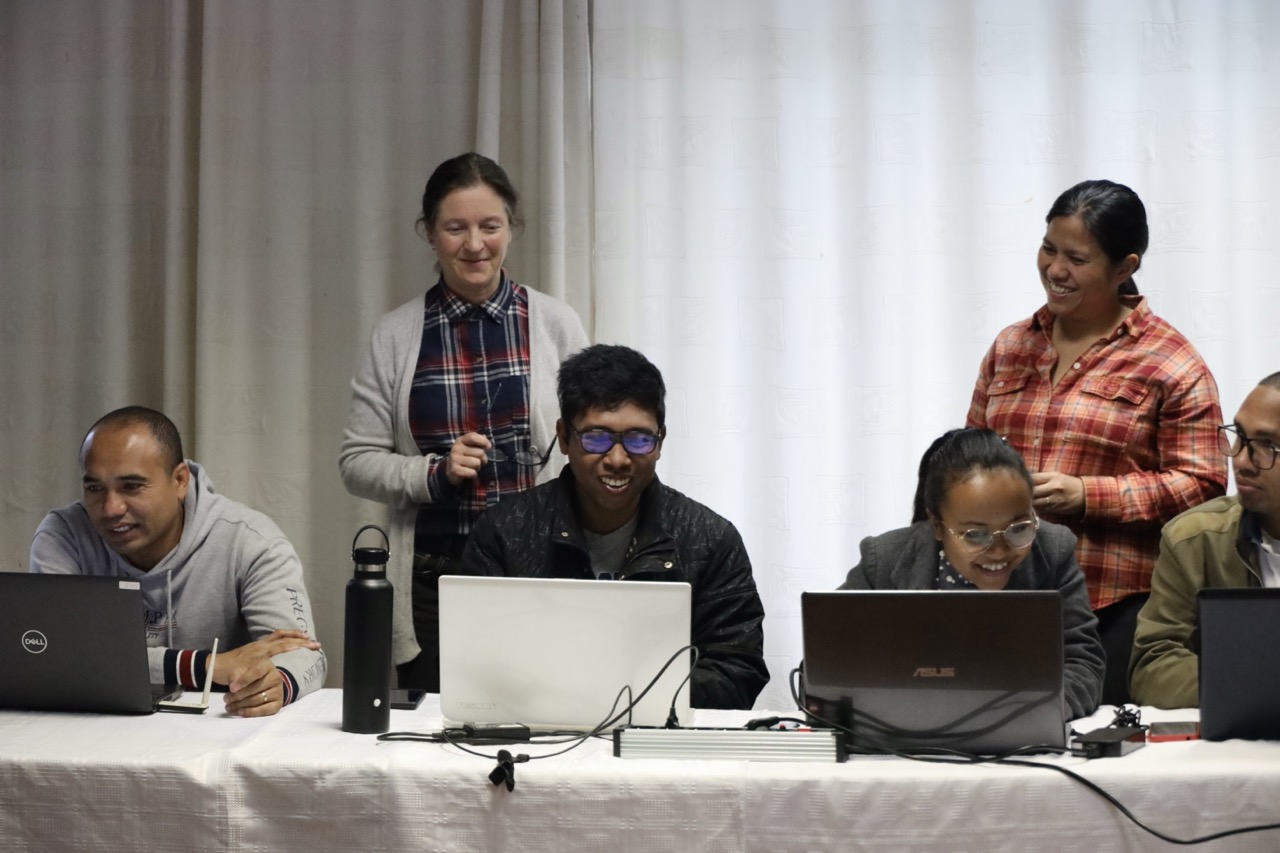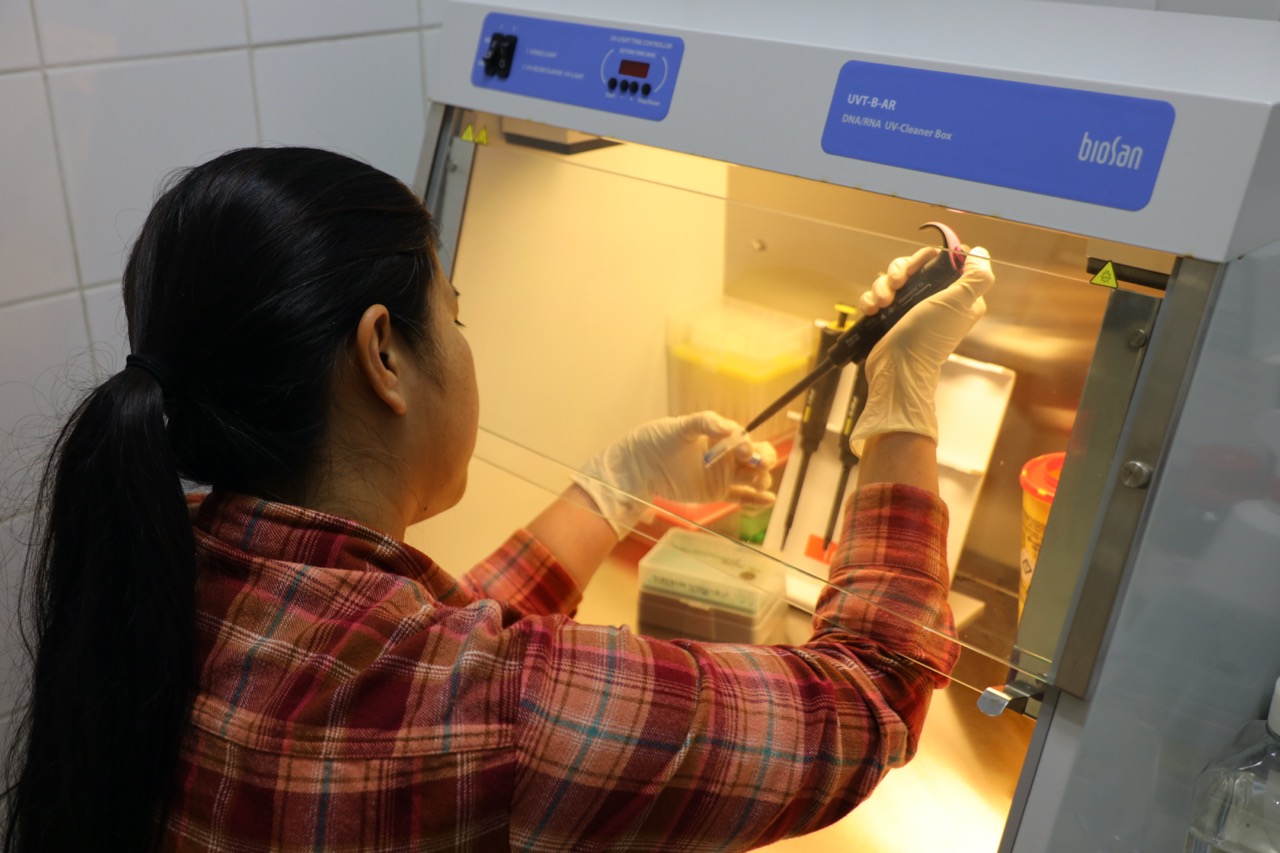CVB & Pivot Host Bioinformatics Workshop
By Johanna Mitra, ICTE/CVB Communications Officer
From July 10-14, 2023, CVB and our partner organization Pivot held an enlightening bioinformatics and genomics workshop at CVB, inviting 16 scientists and medical professionals from across Madagascar to take part in the training. Amongst these were representatives from the Ministry of Public Health, Le Laboratoire d'Analyses Médicales Malagasy (LA2M), Centre d'Infectiologie Charles Mérieux (CICM), the University of Antananarivo, and the University of Fianarantsoa.
Through lectures and hands-on lab work in CVB's microbiology laboratory, Pivot designed the training with the aim of increasing accessibility to genomics research in Madagascar and building the capacity of Malagasy researchers and professionals across health and environmental fields to apply genomics to priority issues in their respective sectors.

Dr. Shannon Bennett of the California Academy of Sciences and disease ecologist Dr. Pampin Thongsripong lead a section of the workshop.
"[Sequencing technology] is broadly applicable across conservation and human health projects," says Dr. Stephen Popper, an infectious disease scientist and one of the workshop’s instructors. “[With] this common technological platform, [it's important that] people develop a comfort level and skills to be able to use that data for whatever their focus might be," says Dr. Popper. He cites the numerous projects on lemurs, plants, and insects being carried out at CVB, all using the same technology. On the health side, Dr. Rado Rakotonanahary, Pivot’s Research Manager, highlights the workshop’s usefulness in improving our clinical responses to infectious diseases and epidemiological surveillance.
This workshop continues our long-standing partnership with Pivot, aimed at using scientific research to address and improve human health concerns in the Ifanadiana District. At the onset of the COVID-19 pandemic, Pivot and Dr. Rakotonanahary played a crucial role in upgrading our existing microbiology lab to conduct regional PCR testing, significantly strengthening Madagascar's COVID-19 response.
While this year's workshop covered broader topics in bioinformatics, such as sequence assembly, sample processing, and phylogenetic tree construction, workshop leader Dr. Shannon Bennett, Chief of Science at the California Academy of Sciences, placed particular emphasis on the phylogenetic analysis of viruses, specifically SARS-CoV-2, the virus that causes COVID-19. She says one of the workshop's goals is to "…feel comfortable extrapolating the tree pattern into understanding where viruses come from and what might be driving how they move between human communities or across countries."

Dr. Pampin Thongsripong prepares SARS-CoV-2 samples for sequencing in CVB's molecular biology lab, a regional PCR testing site during the COVID-19 pandemic.
Dr. Rindra Rakotoarivony, a temporary lecturer and researcher at the University of Antananarivo, was one of the workshop participants. He studies the preference of malaria-transmitting mosquitos for cattle and humans. As his research requires sequencing both mosquito and human DNA, "I had to be trained on how to do the actual lab work," Dr. Rakotoarivony says. "It's not just doing the sequencing, but everything from the preparation to the protocols you need to follow when sequencing." His work involves using the Oxford Nanopore MinION, a small, portable sequencing device that allows researchers to sequence DNA in real-time, wherever they are. He plans to share what he learned at this workshop with his students to give them another view of how to carry out genomics research in the field.
"Everything you see has DNA or RNA," says Dr. Bennett. "We have the technology now, like never before, to derive the genome of something on a machine the size of a chocolate bar. You can take [the MinION] anywhere you want. As we get more and more insight into the genetic and evolutionary history of everything around us, we need tools to be able to interpret that information and make inferences that will help inform health, conservation, ecology, and even our fundamental basic understanding of life." This workshop was a landmark capacity-building event and we hope to continue providing these tools to Malagasy researchers across scientific fields each year.
Photos by Johanna Mitra
